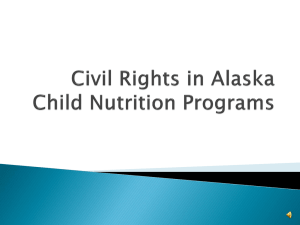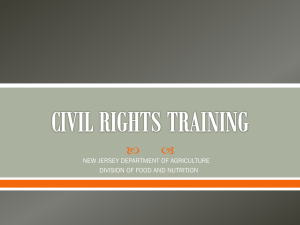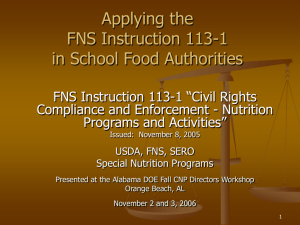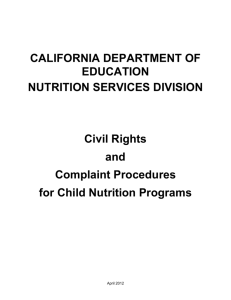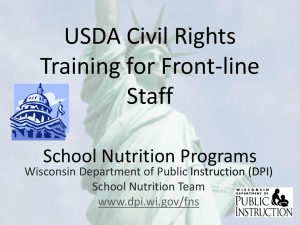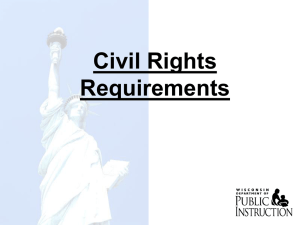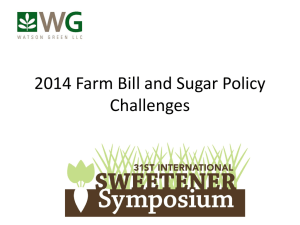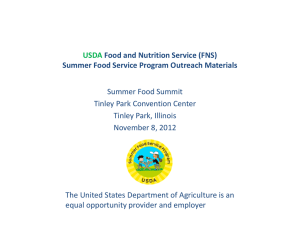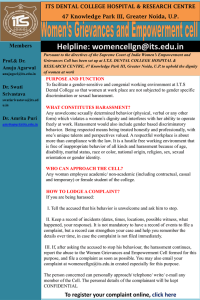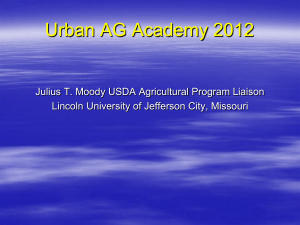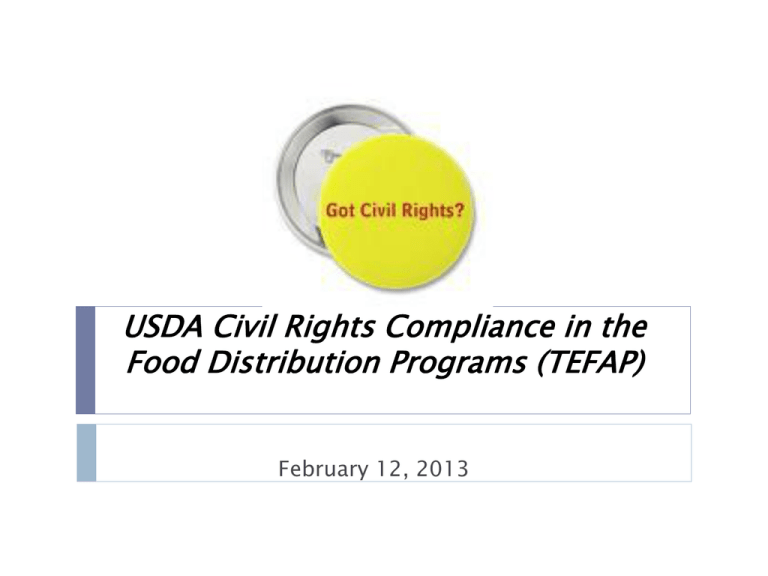
USDA Civil Rights Compliance in the
Food Distribution Programs (TEFAP)
February 12, 2013
Today’s Agenda
Overview/refresher
on Civil Rights (CR)
topics
General
State and
local-level CR
compliance
Our Civil Rights
The
rights of personal liberty guaranteed
to U.S. citizens by the 13th and 14th
Amendments of the Constitution and
Acts of Congress
Civil Rights Concepts
Stereotyping
Preconceived or over-simplified
generalization involving beliefs about a
particular group
Prejudice
A set of rigid and unfavorable attitudes
toward a particular group that is formed
without considering facts
Discrimination
The practice of treating people
differently because of how we have
grouped them in our minds according to
our prejudices
Federal Civil Rights
Laws and Regulations
Title
VI and subsequent
legislation defined federal
authority to protect against
discrimination in our programs
USDA
codified these laws into
departmental civil rights
regulations at 7 CFR 15
FOR MORE
INFO
•US
Dept of Justice
website:
www.usdoj.gov
•US
Dept of Agriculture
Office of Assistant
Secretary for Civil
Rights website:
www.ascr.usda.gov
USDA and FNS Civil Rights
Authority - Regulations
FNS
followed by writing
assurances into program
regulations and FNS CR
Instruction 113
List of federal CR authorities in
FNS 113 Section II
Program CR regulatory citations in
FNS 113 Appendices and program
regulations
FOR MORE
INFO
•FNS
CR Instruction
113 can be found
under “laws and
regulations” on the
USDA Food and
Nutrition Service
Office of Civil Rights
website:
•www.fns.usda.gov/cr
Civil Rights Compliance
Is Not Optional!
Equal Access to benefits
without regard to protected
class:
Race
Color
National Origin
Language
Age
Sex
Disability
Reasonable Accommodation
For More
Information
USDA ASCR
Website:
http://www.ascr.usda.
gov/directives_regs.ht
ml
U.S. Department of
Justice Website:
http://www.justice.gov
/crt/cor/index.php
FNS Instruction 113
(including
Appendices)
Civil Rights Compliance
in FNS Programs
7 AREAS OF
COMPLIANCE
•
•
CR
laws and regs define seven
areas of compliance
Program nondiscrimination regs
further define
•
•
•
Today
we’ll discuss these as
they apply in TEFAP
•
•
Assurances
Public Notification
System
Limited English
Proficiency
Training
CR Compliance
Reviews
CR Complaints
Equal Opportunity
Rule
Assurances
FOR MORE
INFO
Required for agreements at
every operating level
Retailer
Federal
State
Local
Subrecipient
“The [program applicant] hereby
agrees to comply with Title VI
of the Civil Rights Act of
1964…”
•
•
FNS CR
Instruction 113
Section X and
Appendices
Program
regulations
Public Notification
Availability of the Program
How to file a CR Complaint
At service delivery point
Nondiscrimination Statement
Applicants, participants, potential eligibles, community
leaders, grassroots and referral organizations
Rights/Responsibilities/Steps needed to participate
Brochures, websites, anything that mentions an FNS
program
Accessible Message
Nondiscrimination
Statement
FOR MORE
INFO
In accordance with Federal law and U.S.
Department of Agriculture (USDA) policy, this
institution is prohibited from discriminating on
the basis of race, color, national origin, sex, age,
or disability.
•MARO
SNP Policy
Memo 08-008 - May
27, 2008
To file a complaint alleging discrimination, write
USDA, Office of Adjudication, 1400 Independence
Avenue SW, Washington, DC 20250-9410 or call,
toll free, (866) 632-9992 (Voice). Individuals who
are hearing impaired or have speech disabilities
may contact USDA through the Federal Relay at
(800) 877-8339 or (800) 845-6136 (Spanish).
USDA is an equal opportunity provider and
employer.
•FNS
USDA is an equal opportunity provider and
employer.
CR Instruction
113 Section IX Public
Notification
‘…And Justice For All’
Poster
Posters available in limited
supply
Contact me with request
Can download and print from the
FNS CR website
Preferable to print in 11”x
17” format
Phone numbers on poster are
outdated but will redirect to
correct number
FOR MORE
INFO
•FNS
CR Instruction
113 Section IX Public
Notification
•MARO
SNP Policy
Memo 08-008
•Poster
at website:
http://www.fns.usda
.gov/cr/justice_print
ing.htm. Includes
printing instructions
and languages other
than English.
Limited English Proficiency (LEP)
Assess
for language needs in your
population
Make sure all staff know what to
do when an LEP client needs help
Provide translated materials if there
are many people who speak another
language
Hire bilingual staff when possible
Use professional or certified
interpreters
Do not ask clients to bring
their own interpreters.
For More Information
FNS Instruction 113
Section VII, Limited
English Proficiency
U.S. Department of
Justice’s LEP
website:
http://www.lep.gov/
Reasonable Accommodation
Ensure access for people with
disabilities!
Parking lots, entrances and exits, halls,
elevators, restrooms, sign language
interpreters, Braille signage, service
animals
Alternative arrangements for service
Equal Opportunity for
Religious Organizations
FBOs and CBOs have equal footing as long as:
Discrimination prohibited against an
organization on the basis of religion, religious
belief or character in the distribution of funds
FBOs can use space in their facilities without
removing religious art or symbols
Equal Opportunity for
Religious Organizations
Beneficiaries also protected!
No organization that receives direct
assistance from the USDA can discriminate
against a beneficiary or prospective
beneficiary on the basis of religion or
religious belief
FBOs retain their independence and carry
out their mission, as long as USDA funds
or activities do not support worship,
religious instruction or proselytizing.
Civil Rights Training
All State and local staff – especially
frontline staff - should receive civil rights
training appropriate to her/his position.
All frontline staff should be informed
annually:
What to do if an LEP person requests assistance;
What to do if someone requests reasonable
accommodation, including special diets; and
How to recognize and handle a civil rights
complaint.
Civil Rights Training
For Other Staff and Volunteers
All State and local staff – especially frontline
staff and anyone who directly deals with the
public- should receive this mandatory
training;
This slideshow can be used to train additional
staff and volunteers who are not in
attendance today;
If you would like this training slideshow
emailed to you, please contact me at (304)
549-2892 or email me at mpaul@wvda.us.
Also, please keep a record of all staff and
volunteers who you train and have them to
acknowledge this training by signing and
dating a form that you will need to create and
keep in your TEFAP manual.
Other Areas of
Civil Rights Training
Collection and use of
data
Effective public
notification systems
Complaint Procedures
Compliance review
techniques
Conflict resolution
skills
Resolution of
noncompliance
Requirements for
reasonable
accommodations of
persons with
disabilities
Requirements for
language assistance.
Customer service skills
“Quick Guide to Civil Rights”
Complaints of Discrimination
Allege
that the applicant or participant was treated
differently because of
Race
Color
National
origin
Age
Gender
Disability
Religion
Complaints of Discrimination
Right to File
Acceptance
All complaints forwarded to FNS Regional Office ASAP!
Complaint Forms
180 days within date of alleged action
Assure confidentiality
Encouraged to resolve at lowest level
Not mandatory but encouraged
Appendix E sample complaint form (long version)
Written/Verbal complaints
Person receiving complaint must write up
Include necessary information
Processing and Resolving Complaints of
Discrimination
Must
be processed within 90 calendar days of
receipt
USDA
CR regulations require states to have a
complaint processing system so that
Subrecipients recognize a CR complaint
Subrecipients know State CR contacts
Everyone understands importance of timeliness in
processing
Civil Rights Complaint Form
In accordance with Federal law and U.S. Department of Agriculture policy, this
institution is prohibited from discriminating on the basis of race, color, national
origin, sex, age, or disability. To file a complaint alleging discrimination, write USDA,
Director, Office of Civil Rights, 1400 Independence Avenue SW, Washington, DC 20250-9410
or call, toll free, (866) 632-9992 (Voice). Individuals who are deaf, hard of hearing or have
speech disabilities may contact USDA through the Federal Relay at (800) 877-8339 or (800)
845-6136 (Spanish). USDA is an equal opportunity provider and employer.
Complaints can also be sent to Regional Director, Civil Rights, 300 Corporate Blvd, Mercer
Corp Park, Robbinsville NJ 08691.
NAME OF COMPLAINANT:
ADDRESS:
TELEPHONE #:
NAME AND TITLE OF PERSON/PERSONS RESPONSIBLE FOR DISCRIMINATION:
ADDRESS:
DATE OF INCIDENT:
PLEASE INDICATE BASIS FOR DISCRIMINATION:
RACE ___ COLOR ___ AGE ___ SEX ___ NATIONAL ORIGIN ___ DISABILITY ___
PLEASE DESCRIBE BRIEFLY THE BASIS OF YOUR COMPLAINT:
NAMES/ADDRESSES OF ANY WITNESSES:
Postaward Public Notification
Questions
Do printed materials contain the
nondiscrimination statement?
Do graphic materials reflect equality?
Do public announcements contain the
nondiscrimination statement?
Postaward Public Notification
Questions
Are AJFA poster appropriately displayed?
Is Program info available in alternative
formats and languages?
Are program information materials available
to all?
Postaward Civil Rights
Complaint Processing Questions
How are participants advised of their right to
file a CR complaint?
Are staff members aware of how to recognize
a CR complaint and what to do if they get
one?
We recommend the use of a CR complaint
form. (Sample shown on earlier slide.)
Postaward Reasonable
Accommodations Questions
Are applicants and participants with disabilities
accommodated appropriately? If no, explain.
Resolution of Noncompliance
A
factual finding of CR noncompliance
Denying opportunity to apply for benefits
Providing benefits in a disparate manner because of
membership in a protected class
Exclusion of members of a protected class from boards
Selecting sites in a manner that denies access to
members of a protected class
Who?
Does what? When? If unresolved?
Scenario 1
A
participant complains that
the church where she picks up
her food requires her to
participate in a prayer service
before taking her box home.
Scenario 2
A person in a wheelchair complains
that the site where he was told to pick
up his food package is not accessible
to public transportation.
Scenario 3
A
man tries to talk with the a
volunteer at a food distribution
site in a language other than
English, but the volunteer can’t
understand him. He leaves the
waiting area without being served.
Scenario 4
A
white woman hears African
American participants being
referred to as “Mrs.”, “Ms. “ or
“Miss,” while they refer to her as
“Donna.”
Contact Information
USDA CR Director Michele Sazo
Phone (609) 259-5061
michele.sazo@fns.usda.gov

